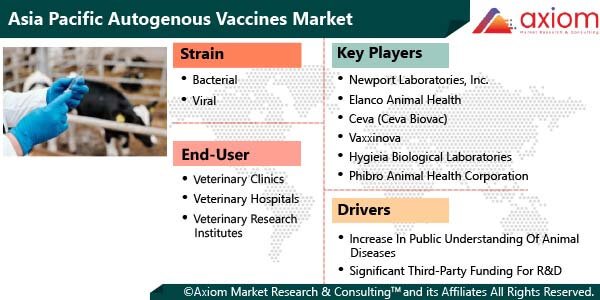Autogenous vaccines are created by isolating and destroying microorganisms in diseased animals and then using the same animals to deliver immunity. The majority of these animal vaccinations are made from bacterial or viral strains. When there is no vaccination available for bacterial and viral illnesses, or when existing vaccines are ineffective, they can be a good alternative. Autogenous vaccinations are approved for use by or under the supervision of a veterinarian, as well as non-veterinarians who have been approved by the government. They're used to treat bacterial and viral illnesses in cattle, pigs, birds, poultry, ruminants, fish, horses, rabbits, and other animals.
Market Dynamics- Asia Pacific Autogenous Vaccine Market
The rising prevalence of contagious diseases is driving demand for customized autogenous vaccines, which is driving the market for autogenous vaccines. A highly contagious disease that mostly affects ruminants, are among the contagious diseases that animals are prone to getting infected. According to the food and agricultural organization, the peste des petits ruminants (PPR) virus, sometimes known as goat plague, infect small ruminant populations. Contagious disease outbreaks substantially disrupt animal production, resulting in direct and indirect financial losses. The government organizations as well as public organizations contribute the economic resources for the prevention and control of contagious infection in livestock, which is expected to facilitate the market growth of autogenous vaccines during the forecast period.
COVID-19 Impact on Asia Pacific Autogenous Vaccine Market
The exclusive COVID-19 impact analysis report by Axiom MRC provides a 360 degree analysis of micro and macro-economic factors on the Asia Pacific autogenous vaccine market. In addition, complete analysis of changes on the Asia Pacific autogenous vaccine market expenditure, economic and international policies on supply and demand side. The report also studies the impact of pandemic on Asia Pacific economies, international trade, business investments, GDP and marketing strategies of key players present in the market.
Asia Pacific Autogenous Vaccine Market- Segmental Overview
Autogenous vaccine market comprises of different market segment like by strain, end user and country.
Asia Pacific Autogenous Vaccine Market by Strain Type
The Asia Pacific autogenous vaccine market includes key segments like bacterial strain and viral strain. The bacterial strain owning to the highest market share leads in the Asia Pacific region. The increasing demand for bacterial strain is surging due to high prevalence of livestock and zoonotic diseases leading to large-scale animal deaths. Also the large presence of well-established pharmaceutical firms that are consistently striving for wide commercialization of their vaccines and augmenting their reach is expected to boost the market growth. The rising incidence of canine disorders and adoption of vaccination for the same coupled with the rising pet population in the Asia Pacific region are some of the key factors contributing to the growth of the market share of the region.
Asia Pacific Autogenous Vaccine Market by End User
The autogenous vaccine market finds its major end user in livestock farming companies, veterinary research institutes, veterinary clinics and hospitals. Livestock farming companies is expected to dominate the market due to increasing approach of companies are raising awareness about animal health among the livestock manufacturing companies, as they deal with a large number of animals. Furthermore, increased funding and support for international veterinary disease eradication programs and growing popularity of animal health insurance are expected to fuel vaccine demand from livestock companies.
Asia Pacific Autogenous Vaccine Market by Country
The Asia Pacific autogenous vaccine market is studied for the following countries like China, India, Japan, Australia and South Korea. The market in Asia Pacific is anticipated to expand at a considerable pace during the forecast period. In Asia Pacific China and India are expected to offer notable growth opportunities for the autogenous vaccines market due to increasing number of emergence of infectious diseases, the large population of animals suffering from diseases and ongoing veterinary vaccine projects will boost the autogenous vaccine market. Increasing animal care spending and research & development activities in the veterinary biologics sector further favors the growth of the autogenous vaccines market in Asia Pacific.
Asia Pacific Autogenous Vaccine Market Key Player
The key players in autogenous vaccine market are Boehringer Ingelheim International, Elanco Animal Health, Ceva (Ceva Biovac), Phibro Animal Health Corporation, UVAXX Pte Ltd, Bimeda, Deltamune Animal Health, Epitopix, Genova Labs, Newport Laboratories, Hygieia Biological Laboratories, Vaxxinova, Elanco Animal Health, Addison Biological Laboratory, Phibro Animal Health Corporation and LOHMANN TIERZUCHT GmbH among others.
Recent Developments:
October 2019: Ceva entered into a license agreement with ProBioGen AG for the manufacture of vectorised poultry vaccines using ProBioGen’s proprietary AGE1.CR technology.
September 2019: Agri Labs (Huvepharma, Inc.) established a new fermentation plant in Peshtera, Southern Bulgaria. This increases Huvepharma’s total production capacity by 30%. Huvepharma now has flexibility to ferment its entire current product portfolio in one place, with additional capacity remaining to introduce new products to their range in the future.
April 2018: Pharmaq announced the production of fish vaccines at a development center in Suzhou, China. Pharmaq, now owned by Zoetis, and the parent company is also ramping up vaccine R&D for other species.
March 2018: Apiam acquired Passionate Vetcare, a regional veterinary clinic in the north west of Bendigo, to support the opening of Apiam’s Bendigo Emergency & Referral Centre for servicing in the Central Victorian region.
March 2018: Ceva launched innovative programs to promote the production of autogenous poultry vaccines by focusing on more sustainable production.











